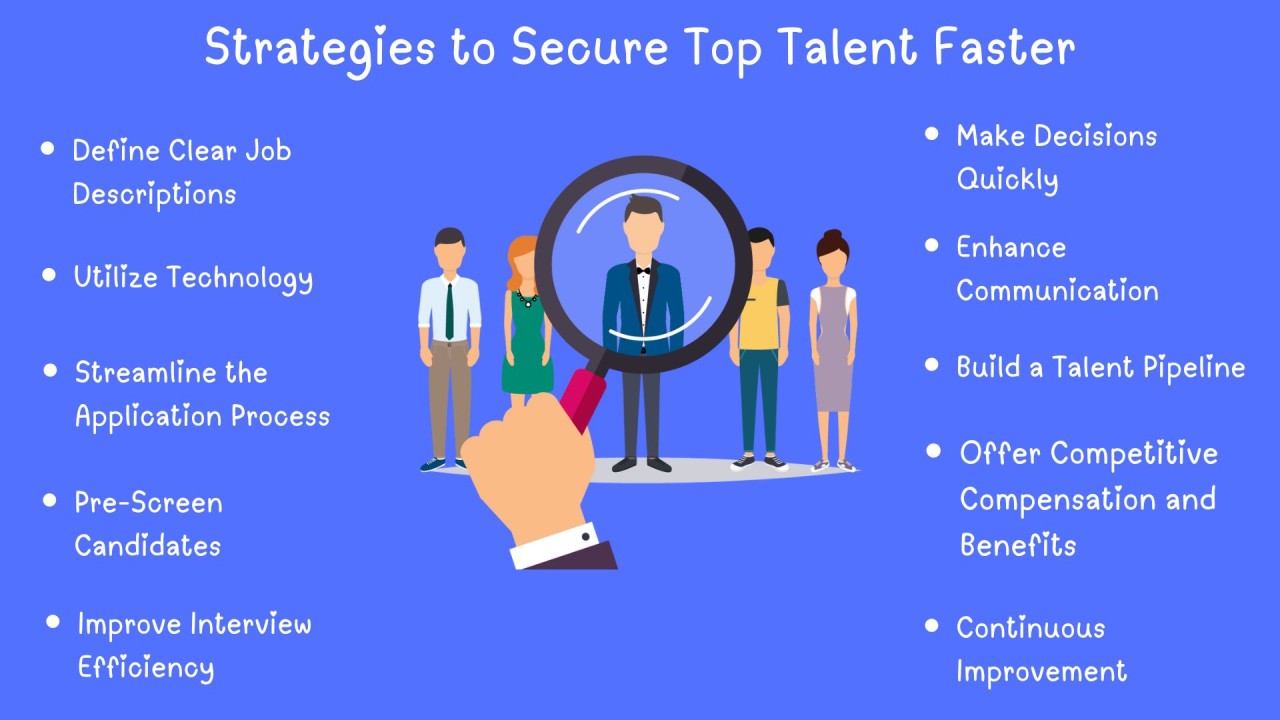
Accelerate Your Hiring Process: 10 Proven Strategies to Secure Top Talent Faster
Introduction
Hiring is one of the most critical processes in any organization. A quick and efficient hiring process can significantly impact a company's productivity, morale, and bottom line. However, many companies struggle with lengthy and cumbersome hiring procedures that can result in losing top talent to competitors. This article explores various strategies and best practices to streamline and speed up the hiring process without compromising the quality of hires.
1. Define Clear Job Descriptions
A well-defined job description is the foundation of an efficient hiring process . It ensures that both the employer and the candidates have a clear understanding of the role and its requirements.
Key Elements of an Effective Job Description:
Benefits:
2. Utilize Technology
Leveraging technology can significantly reduce the time taken to complete various stages of the hiring process.
Applicant Tracking Systems (ATS):
An ATS can automate many aspects of recruitment, from posting jobs to screening resumes. It can also help in managing and communicating with candidates efficiently.
Video Interviews:
Video interviews can be conducted more flexibly compared to in-person interviews. They save time on scheduling and travel, and can be recorded for further review.
AI and Machine Learning:
AI-powered tools can help in screening resumes and identifying the best candidates based on predefined criteria. Machine learning algorithms can learn from past hiring data to improve the process continually.
Online Assessments:
Online skill assessments can quickly filter out candidates who do not meet the required competency levels, thus saving time on unnecessary interviews.
3. Streamline the Application Process
A cumbersome application process can deter qualified candidates. Simplifying this process can enhance the candidate experience and speed up hiring.
Tips for Simplifying the Application Process:
Benefits:
4. Pre-Screen Candidates
Pre-screening candidates can help in quickly identifying those who meet the basic requirements for the role.
Methods:
Benefits:
5. Improve Interview Efficiency
Interviews are a critical part of the hiring process, but they can also be time-consuming. Improving the efficiency of interviews can significantly speed up hiring.
Structured Interviews:
Structured interviews, where each candidate is asked the same set of questions, ensure consistency and fairness. They also make it easier to compare candidates.
Panel Interviews:
Panel interviews, where multiple interviewers assess a candidate simultaneously, can reduce the number of interview rounds required.
Use of Interview Guides:
Prepare interview guides with questions and criteria for evaluation. This ensures that interviews stay focused and productive.
Interview Scheduling Tools:
Utilize scheduling tools to coordinate availability and set up interviews quickly. These tools can automate reminders and confirmations, reducing back-and-forth communication.
Benefits:
6. Make Decisions Quickly
Delays in decision-making can result in losing top candidates. Streamlining the decision-making process is crucial for a faster hiring process.
Tips for Faster Decision-Making:
Benefits:
领英推荐
7. Enhance Communication
Effective communication is key to speeding up the hiring process. It ensures that all parties are informed and on the same page throughout the process.
Communication Strategies:
Benefits:
8. Build a Talent Pipeline
Having a talent pipeline means having a pool of pre-screened candidates who are ready to be hired when a position opens up. This proactive approach can drastically reduce the time to fill positions.
Strategies for Building a Talent Pipeline:
Benefits:
9. Offer Competitive Compensation and Benefits
A competitive compensation and benefits package can attract top talent quickly. It also reduces the time spent negotiating offers.
Key Components:
Benefits:
10. Continuous Improvement
The hiring process should be continuously reviewed and improved based on feedback and performance metrics.
Strategies for Continuous Improvement:
Benefits:
Conclusion
Speeding up the hiring process is essential in today’s competitive job market. By defining clear job descriptions, utilizing technology, streamlining the application process, pre-screening candidates, improving interview efficiency, making decisions quickly, enhancing communication, building a talent pipeline, offering competitive compensation, and continuously improving the process, companies can attract and hire top talent more quickly and efficiently. Implementing these strategies will not only save time and resources but also enhance the overall candidate experience and strengthen the company’s reputation as an employer of choice.
FAQs:
1. Why is it important to speed up the hiring process ?
2. How can clear job descriptions speed up hiring ?
3. What role does technology play in speeding up the hiring process ?
4. How can the application process be simplified?
5. What are effective pre-screening methods?
6. How can interviews be made more efficient?
7. What tips can help in making quick hiring decisions?
8. Why is communication important in the hiring process?
9. How does building a talent pipeline benefit the hiring process?
10. What should be included in a competitive compensation and benefits package?
11. How can companies continuously improve their hiring process?
Good opportunity
Associate Consultant at FIRESTONE GLOBAL
5 个月CFBR
Associate Consultant
5 个月CFBR